26 آگوست When Thumb Sucking Doesn’t Suck
Nail-biters, thumb-suckers experience fewer allergies

Many parents discourage their children from nail-biting and thumb-sucking, in part to keep germs out of their mouths. Though few adults see merit in these dirty habits, new research suggests that they may come with a positive side.According to a press release issued by McMaster University, a new study found that children who suck their thumbs or bite their nails are less like to develop allergy sensitiveness. And kids who do both are even less likely to be allergic to dust mites, grass, cats, dogs, horses and airborne fungi.
To conduct the study, researchers measured the thumb-sucking and nail-biting habits of more than 1,000 children in New Zealand at the ages of five, seven, nine and eleven.
They also measured atopic sensitization using skin prick testing at ages 13 and 32. Researchers found that 31 percent of them were frequent thumb-suckers or nail-biters.
When measured at 13 years old, 45 percent of all the children had atopic sensitization. However, among children who either sucked their thumbs or bit their nails, only 40 percent had allergies. And among children who practiced both nasty habits, only 31 percent displayed allergies. These findings held true when the allergies were measured in adulthood.
Researchers say that the study did not find an association between thumb-sucking and nail-biting and the development of asthma or hay fever.
“Our findings are consistent with the hygiene theory that early exposure to dirt or germs reduces the risk of developing allergies,” says Dr. Malcolm Sears in the press release. Dr. Sears hails from McMaster University’s School of Medicine and works for the Firestone Institute for Respiratory Health and St. Joseph’s Healthcare Hamilton. He adds:
“While we don’t recommend that these habits should be encouraged, there does appear to be a positive side to these habits.”
This study was published in August in Pediatrics. It was funded by Phil Silva. The authors disclosed no conflicts of interest.
http://www.eurekalert.org/pub_releases/2016-07/mu-tan070816.php
http://pediatrics.aappublications.org/content/138/2/e20160443


